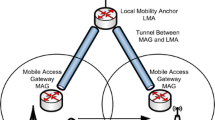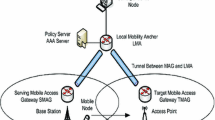Abstract
Seamless mobility in future generation networks, which are envisioned to be heterogeneous in nature, is an important issue. While Internet Engineering Task Force (IETF) work groups have standardized various mobility management protocols, such as Mobile IPv6 and Proxy Mobile IPv6, a comprehensive study of these protocols in terms of various performance characteristics is a challenging issue. Moreover, this study also considers the recent proposals from IETF in distributed mobility management (DMM) protocols. In this paper, a novel analytical model is developed for comparison of various mobility management protocols in terms of handover latency, as well as packet density, and packet arrival rate during the handover time by applying transport engineering principles in the field of telecommunication. The signaling cost analysis using signaling overhead incurred during protocol operations is given for each of these protocols. The number of packets that can be lost during the handover operation is also obtained using this model. Moreover, it presents a unified framework using which one can assess the performance characteristics of both host based and network based mobile IP protocols. One can also assess the performance of centralized and DMM approaches. The correctness of the proposed model is established by the fact that it leads to results similar to those obtained by applying some of the existing models. At the same time, the model allows one to obtain additional results showing the effect of packet density and packet arrival rate on the handover latency.




















Similar content being viewed by others
References
3GPP. (2002). IMT -2000 QoS classes. TSG 17, 3rd Generation Partnership Project (3GPP). http://www.3gpp.org/ftp/tsg_ran/TSG_RAN/TSGR_17/Docs/PDF/RP-020520.
3GPP. (2009). QoS concepts and architecture. TS 23.107, 3rd Generation Partnership Project (3GPP).
Amarsinh, V., & Devane, S. (2013). Improved latency handover in fast mipv6 for streaming video. In S. Unnikrishnan, S. Surve, & Bhoir, D. (Eds.), Advances in computing, communication, and control, communications in computer and information science (Vol. 361, pp. 381–392). Berlin: Springer. doi:10.1007/978-3-642-36321-4_35.
Dizhi, Z., Hanwen, Z., Zhijun, X., & Yujun, Z. (2010). Evaluation of fast pmipv6 and transient binding pmipv6 in vertical handover environment. In 2010 IEEE international conference on communications (ICC) (pp. 1–5). doi:10.1109/ICC.2010.5502788.
Shin, D.-H., Moses, D., Venkatachalam, M., & Bagchi, S. (2013). Distributed mobility management for efficient video delivery over all-IP mobile networks: Competing approaches. In IEEE network, March–April 2009 (vol. 27, pp. 28–33). doi:10.1109/MNET.2013.6485093.
Giust, F., De La Oliva, A., Bernardos Carlos, J., & Da Costa, R. P. F. (2011). A network-based localized mobility solution for distributed mobility management. In 14th International symposium on wireless personal multimedia communications (WPMC) (p. 15).
Guan, J., Zhou, H., Xu, C., Zhang, H., & Luo, H. (2011). The performance analysis of the multicast extension support for proxy mipv6. Wireless Personal Communications, 61(4), 657–677. doi:10.1007/s11277-011-0425-1.
Gundavelli, S., Leung, K., Devarapalli, V., Wichorus, K., Chowdhury, K., & Patil, B. (2008). Proxy mobile ipv6. RFC 5213. http://tools.ietf.org/html/rfc5213.
Han, Y. H., & Jeong, D. (2006). A comprehensive study on handover performance of hierarchical mobile ipv6. In E. Sha, S. K. Han, C. Z. Xu, M. H. Kim, L. Yang, B. Xiao (Eds.), Embedded and ubiquitous computing, lecture notes in computer science (Vol. 4096, pp. 1108–1118). Berlin: Springer. doi:10.1007/11802167_111.
Iversen, V. B. (2001). Teletraffic engineering handbook, ITU-D Study Group 2 Question 16/2. Technical University of Denmark.
Jang, S., Jang, H., & Jeong, J. (2013). Cost-effective and distributed mobility management scheme in sensor-based pmipv6 networks with spig support. In Q. Zu, B. Hu, & A. Elci (Eds.), Pervasive computing and the networked world, lecture notes in computer science (Vol. 7719, pp. 259–273). Berlin: Springer. doi:10.1007/978-3-642-37015-1_21.
Greenshields, B. D., Bibbins, J. R., Channing, W. S., & Miller, H. H. (1935). A study of traffic capacity. In Proceedings of the highway research board. (vol. 14, pp. 448–477).
Johnson, D., Perkins, C., & Arkko, J. (2004). Mobility support in ipv6. RFC 3775. http://www.ietf.org/rfc/rfc3775.txt.
Jong-Hyouk, L., & Ernst, T. (2011). Lightweight network mobility within pmipv6 for transportation systems. IEEE Systems Journal, 5(3), 352–361. doi:10.1109/JSYST.2011.2158681.
Jong-Hyouk, L., Ernst, T., & Tai-Myoung, C. (2010). Cost analysis of ip mobility management protocols for consumer mobile devices. IEEE Transactions on Consumer Electronics, 56(2), 1010–1017. doi:10.1109/TCE.2010.5506033.
Jong-Hyouk, L., Ernst, T., & Chilamkurti, N. (2012). Performance analysis of pmipv6-based network mobility for intelligent transportation systems. IEEE Transactions on Vehicular Technology, 61(1), 74–85. doi:10.1109/TVT.2011.2157949.
Lee, J.-H., Bonnin, J., & Lagrange, X. (2012). Host-based distributed mobility management support protocol for IPv6 mobile networks. In IEEE 8th international conference on wireless and mobile computing, networking and communications (WiMob) (pp. 61–68). doi:10.1109/WiMOB.2012.6379140.
Kara, N. (2009). Mobility management approaches for mobile ip networks: Performance comparison and use recommendations. IEEE Transactions on Mobile Computing, 8(10), 1312–1325. doi:10.1109/TMC.2009.36.
Ki-Sik, K., Wonjun, L., Youn-Hee, H., & Myung-Ki, S. (2008). Handover latency analysis of a network-based localized mobility management protocol. In IEEE international conference on communications (ICC ’08) (pp. 5838–5843). doi:10.1109/ICC.2008.1092.
Kong, K. S., Roh, S. J., & Hwang, C. S. (2004). A comparative analytical study on the performance of ip mobility protocols: Mobile ipv6 and hierarchical mobile ipv6. MoMM, 16(4), 437–446. doi:10.1109/TNET.2007.902700.
Koodli, R. (2005). Fast handovers for mobile ipv6. RFC 4068. http://tools.ietf.org/html/rfc4068.
Kwon, N., Kim, H., Oh, S. T., & Choo, H. (2011). Fast handover scheme based on mobility management of head mag in pmipv6. In B. Murgante, O. Gervasi, A. Iglesias, D. Taniar, & B. Apduhan (Eds.), Computational science and its applications (ICCSA 2011), lecture notes in computer science (Vol. 6786, pp. 181–192). Berlin: Springer. doi:10.1007/978-3-642-21934-4_16.
Liu, D., Zuniga, J. C., Seite, P., Chan, H., & Bernardos, C. J. (2014). Distributed mobility management: Current practices and gap analysis. Internet Draft, Internet Engineering Task Force. http://datatracker.ietf.org/doc/draft-ietf-dmm-best-practices-gap-analysis/.
Langar, R., Bouabdallah, N., & Boutaba, R. (2008). A comprehensive analysis of mobility management in mpls-based wireless access networks. IEEE/ACM Transactions on Networking, 16(4), 918–931. doi:10.1109/TNET.2007.902700.
Liu, M., Guo, X., Zhou, A., Wang, S., Li, Z., & Dutkiewicz, E. (2011). Low latency ip mobility management: Protocol and analysis. EURASIP Journal on Wireless Communications and Networking, 2011(1), 1–16. doi:10.1186/1687-1499-2011-25.
Lu, H. (2011). Sms-mipv6: An end-to-end mechanism for ipv6 mobility management in mobile networks. Wireless Personal Communications, 59(2), 217–235. doi:10.1007/s11277-009-9914-x.
Makaya, C., & Pierre, S. (2008). An analytical framework for performance evaluation of ipv6-based mobility management protocols. IEEE Transactions on Wireless Communications, 7(3), 972–983. doi:10.1109/TWC.2008.060725.
Makaya, C., & Pierre, S. (2008). An analytical framework for performance evaluation of ipv6-based mobility management protocols. IEEE Transactions on Wireless Communications, 7(3), 972–983. doi:10.1109/TWC.2008.060725.
Makaya, C., & Pierre, S. (2008). Enhanced fast handoff scheme for heterogeneous wireless networks. Computer Communications, 31(10), 2016–2029. doi:10.1016/j.comcom.2008.01.026.
May, A. (1990). Traffic flow fundamentals. Prentice Hall. http://books.google.co.in/books?id=JYJPAAAAMAAJ.
Meng, W., Georgiades, M., & Tafazolli, R. (2008). Signalling cost evaluation of mobility management schemes for different core network architectural arrangements in 3g pp lte/sae. IEEE Vehicular Technology Conference, VTC Spring, 2008, 2253–2258. doi:10.1109/VETECS.2008.501.
Ming, Z., Yujin, L., & Wenye, W. (2012). Modeling and analytical study of link properties in multihop wireless networks. IEEE Transactions on Communications, 60(2), 445–455. doi:10.1109/TCOMM.2012.010512.090739.
Nashaat, H., Rizk, R., & Mahdi, H. (2011). An analytical framework of fast handover for hierarchical mipv6. The Online Journal on Computer Science and Information Technology, 1(2), 38–44.
Park, C., Park, J., Wang, H., & Choo, H. (2012). The fast handover scheme for mobile nodes in nemo-enabled pmipv6. In B. Murgante, O. Gervasi, S. Misra, N. Nedjah, A. Rocha, D. Taniar, B. Apduhan (Eds.), Computational science and its applications (ICCSA 2012), lecture notes in computer science (vol. 7335, pp. 283–296). Berlin: Springer. doi:10.1007/978-3-642-31137-6_22.
Ryu, S., & Mun, Y. (2009). Scheme to prevent packet loss during pmipv6 handover. In M. Gavrilova, C. Tan (Eds.), Transactions on computational science VI, lecture notes in computer science (vol. 5730, pp. 131–142). Berlin: Springer. doi:10.1007/978-3-642-10649-1_8.
Soliman, H., Castelluccia, C., ElMalki, K., & Bellier, L. (2005). Hierarchical mobile ipv6 mobility management (hmipv6). RFC 4140. http://www.ietf.org/rfc/rfc4140.txt.
Soo-Duek, K., Jong-Hyouk, L., & Tai-Myoung, C. (2009). Performance analysis of fast handover schemes for proxy mobile ipv6. In Fourth international conference on systems and networks communications (ICSNC ’09) (pp. 37–42). doi:10.1109/ICSNC.2009.73.
Thajchayapong, S., & Peha, J. (2006). Mobility patterns in microcellular wireless networks. IEEE Transactions on Mobile Computing, 5(1), 52–63. doi:10.1109/TMC.2006.13.
Transportation Engineering OSU Online lab manual. (2003). Traffic flow theory: Professional practice.
Xiao, L., & Yamg, J. (2010). Performance analysis of proxy mobile ipv6 based on ieee802.16e. Frontiers of Electrical and Electronic Engineering in China, 5(4), 475–481. doi:10.1007/s11460-010-0112-0.
Yi, M. K., & Hwang, C. S. (2005). Analytical-numerical study of mobile ipv6 and hierarchical mobile ipv6. In A. Sen, N. Das, S. Das, & B. Sinha (Eds.), Distributed computing (IWDC 2004), lecture notes in computer science (vol. 3326, pp 168–179). Berlin: Springer. soi:10.1007/978-3-540-30536-1_20.
Yokota, H., Chowdhury, K., Koodli, R., Patil, B., & Xia, F. (2010). Fast handovers for proxy mobile ipv6. RFC 5949. http://tools.ietf.org/html/rfc5949.
Yong, L., Haibo, S., Li, S., Depeng, J., & Lieguang, Z. (2009). A comprehensive performance evaluation of pmipv6 over ip-based cellular networks. In IEEE 69th vehicular technology conference, VTC Spring 2009 (pp. 1–6). doi: 10.1109/VETECS.2009.5073288.
Zahran, A., Ben, L., & Saleh, A. (2008). Mobility modeling and performance evaluation of heterogeneous wireless networks. IEEE Transactions on Mobile Computing, 7(8), 1041–1056. doi:10.1109/TMC.2007.70776.
Acknowledgments
This work was carried out under the Vodafone sponsored research project on Wireless Internet at IIT Kharagpur, India.
Author information
Authors and Affiliations
Corresponding author
Rights and permissions
About this article
Cite this article
Vasu, K., Mahapatra, S. & Kumar, C.S. A Comprehensive Framework for Evaluating IPv6 Based Mobility Management Protocols. Wireless Pers Commun 78, 943–977 (2014). https://doi.org/10.1007/s11277-014-1795-y
Published:
Issue Date:
DOI: https://doi.org/10.1007/s11277-014-1795-y




